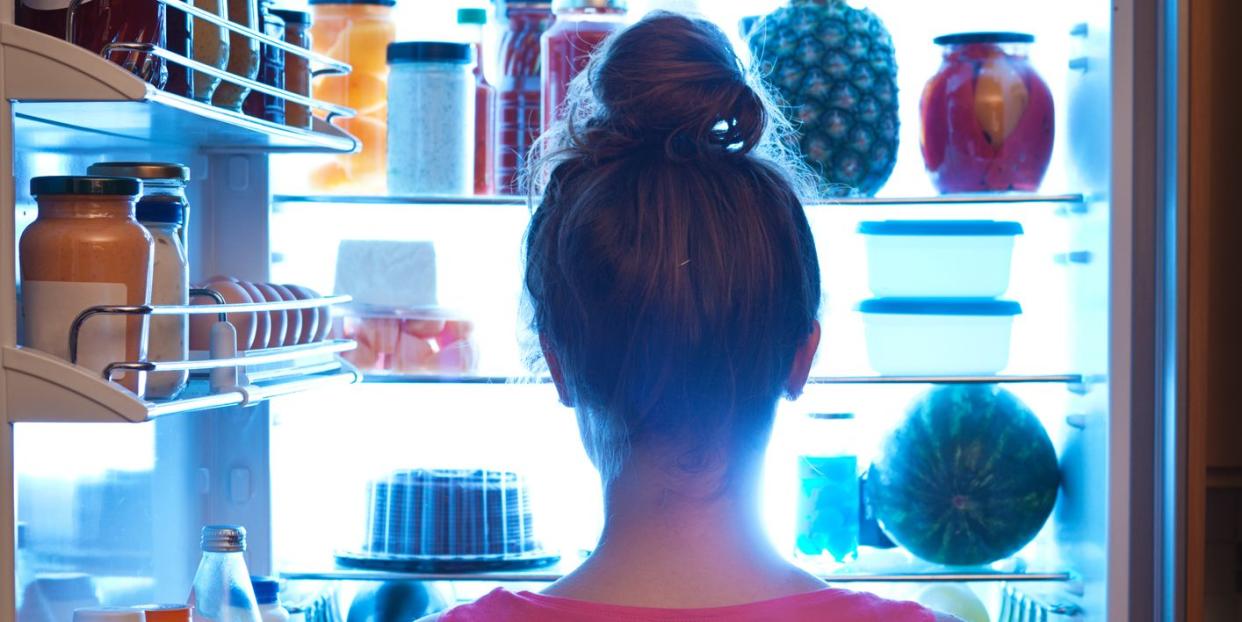Why Do I Like To Wait Until I'm Starving To Eat?

From the moment I landed my first desk job, the day has been divided into Before Lunch and After Lunch—and I prefer that bisecting line to fall around 2 p.m. I'll do the bulk of my work in the Before, focus all my energy into knocking things off the to-do list so I can coast in the After. But by 2pm, I'm ravenous. I've been planning my sandwich for hours! And you know what? I really like it that way.
On some level, as a young adult, I enjoyed pushing meal times because I finally felt the freedom to eat dinner at 10 p.m. because no teacher or dining hall or parent was telling me otherwise. Then, I appreciated that there are no lines at lunch spots after 1:45 p.m. And generally, I relish the feeling of being hungry because it makes that meal time, that break in the work day, so much more satisfying. (And yes, I'll pause here to appreciate the privilege that I have ready access to food, and always have had it; that my hunger never represents a danger that food won't eventually appear.)
I'm hardly the first person to observe this: many cultures have a proverb along the lines of "hunger is the best seasoning." But how does it all work? And should I ber forcing myself to eat at earlier times, or more often? I asked some (surprisingly reassuring) experts.
Why does hunger feel good sometimes?
Nutritionist Molly Kimball, RD, observes that what I'm doing by waiting is getting the effects of two current fad diets: keto and intermittent fasting. "People do report that they feel energized, they feel a heightened sense of clarity when they are in ketosis," Kimball says. "There is something to intermittent fasting specifically and mental clarity—there are a lot of reports of those two things together." That might also explain why I get so much work done before 2 p.m.
Back to that seasoning concept. "There was some research showing that missing a meal can make your taste buds almost more receptive. You're more sensitive to sweet and salty tastes," says Megan Gilmore, a certified nutritionist consultant. "There's one theory that hunger increases your ability to actually taste, so then your food would taste better."
Oh, and that high I feel when it's finally time to settle in with my hot lunch? My brain is releasing happy chemicals. "I've read that there is more dopamine released in response to food when you're very hungry. We know that dopamine is one of the brain's neurotransmitters and it contributes to feelings of pleasure and satisfaction," Gilmore continues. "So it might be that when we're very hungry and we're releasing more dopamine, that we get more satisfaction from our food from that.
Then there's the idea that, like a true diva, I've heightened the anticipation by starting the concert a half hour late. "You've also been looking forward to it and you're ready for it. You're not just on autopilot," Kimball says. "The first couple of bites of anything taste the best, and then we're just eating it because it's on our plate, in front of us."
Kimball also theorizes that I enjoy the discipline of making myself wait—but warns that it could definitely be an unhealthy impulse. "We feel good about ourselves and we like a sense of willpower [when we wait]," she explains. "But the caution is not to take that too far, because people can be very extreme. It's about finding the balance that works for you, and making sure that you're not edging into those disordered eating."
Is it unhealthy to eat this way?
Surprisingly, the nutritionists didn't beg me to change my habits. "You're actually listening to your body and letting your body tell you that you're hungry. You're not just eating because the clock is at a certain time," Kimball says. "Our stomachs are telling us. Our brains are telling us and our energy levels are telling us [when to eat]." Of course, maybe my body is telling me that because I've denied it so much!
I wonder, too, if I should eat at more regular intervals even when it doesn't appeal to me so much—like I've read that you should eat within an hour of waking up, just to jump start your metabolism. But the idea of consuming food at 7am makes me feel gross. "If your body is not telling you you're hungry, then there's a reason for that. I don't think you have to force yourself to eat if you're not hungry," Gilmore says. "I think that's actually a really bad idea, because your body knows better than any sort of time clock."
They do caution that waiting until I'm starving might make me reach for unhealthy foods, as the body will start craving big whopping carbs for a jolt of energy. And yep, ding ding ding, extremely guilty. "If you go too long, you might start to be OK with eating just whatever's in front of you. And I feel like that's when you start reaching for the office donuts," Gilmore says. "I would say always be armed with a healthy snack so that you can avoid those moments of temptation."
After chatting with these two kind geniuses, I've decided to try pulling back a bit to examine this habit. What are my motivations? Am I making good food choices when 2:53 p.m. (eeek!) comes along? And in the mean time, I'm carrying bananas in my purse at all times.
You Might Also Like

